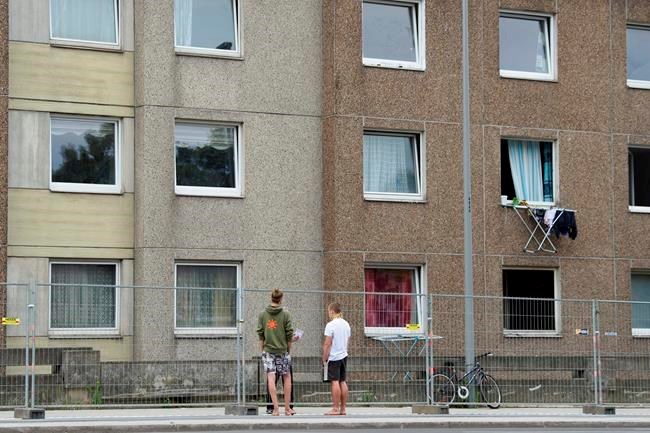BERLIN — German authorities slapped new lockdown measures Tuesday on a western region that has seen hundreds of coronavirus infections linked to a slaughterhouse, trying to make sure the cluster doesn't race into the wider community.
Authorities initially said more than 1,550 people had tested positive for coronavirus at the Toennies slaughterhouse in Rheda-Wiedenbrueck, but by Tuesday afternoon they said the exact number was still being verified.
Thousands of workers, many of them migrants from Eastern Europe, and family members have been put under a quarantine to try to halt the outbreak.
The governor of North Rhine-Westphalia state, Armin Laschet, said people in Guetersloh county for the next week will face some of the same restrictions that existed across Germany during the early stages of the pandemic in March.
These include limiting the number of people who can meet in public to those from a single household or two people from separate households, Laschet said.
“We will order a lockdown for the whole of Guetersloh county," he told reporters Tuesday. “The purpose is to calm the situation, to expand testing to establish whether or not the virus has spread beyond the employees of Toennies.”
"We will get a better picture of the situation through intensive testing, and can then see more clearly within seven days what the situation is,” Laschet said.
Cinemas, fitness studios and bars will be closed, but stores will remain open and restaurants can still serve customers from the same household. Previously, the western county had only closed schools and daycare
Similar restrictions are being imposed in
Prior to the Toennies outbreak, Germany had been widely praised for its handling of the pandemic. Intensive testing, tracing and hospital preparation measures kept Germany’s death toll five times smaller than Britain’s. Germany has seen over 8,900 confirmed virus deaths and about 192,000 cases.
Toennies Group, a family-owned company, has been criticized for using subcontractors for parts of its operation. The practice, which is common in the German meat industry and which the government now wants to ban, often involves migrant workers living in cramped communal housing and being transported to slaughterhouses in minibuses, heightening the risk of infection.
A video circulating on social media also showed workers at the plant seated close together during break times, although the company has disputed how recent the video is.
Laschet expressed his frustration Tuesday at the company's handling of the outbreak, saying authorities had to order Toennies — Germany's biggest meat processing company — to release the names of its employees.
“The readiness to
Laschet said the measures will be lifted June 30 if the situation has improved, but declined to provide specific parameters for success. He also urged other regions in Germany not to discriminate against people from Guetersloh.
The German news agency dpa reported that 14 people on vacation, some of them from Guetersloh, were told Monday to leave the northeastern island of Usedom, a popular Baltic Sea resort. And Bavaria issued a ban on hotels renting rooms to people from Guetersloh or other counties with more than 50 new cases per 100,000 inhabitants. Exceptions will be made for people who can present a negative coronavirus test.
Separately, virus cases also were reported Tuesday at another slaughterhouse in Wildeshausen, in northwestern Germany. Twenty-three workers at the PHW Group site tested positive, and more than 1,100 people working there were to be tested, officials said.
The head of Germany's disease control
“It's certainly the case that if you live in cramped conditions and small rooms then that's a situation where the virus can spread more easily,” said Lothar Wieler, chief of the Robert Koch Institute.
But he added that low temperatures in parts of the plant, intended to keep the meat cool, could also play a role.
“Another factor, which we don't think is small, is the development of aerosols,” said Wieler, referring to tiny droplets that can linger in the air and potentially contain viruses.
Wieler said the outbreak at the slaughterhouse and others linked to religious gatherings could certainly spread to other people in Germany.
“That's why it's so important that we remain careful,” he said. “The virus is still in the country and if we give it the chance to spread, then it will take that chance."
But he expressed hope that Germany could avoid a second wave of the pandemic if people followed government advice on social distancing and hygiene.
Dr. Ute Rexroth, a senior Robert Koch Institute official involved in Germany's pandemic response, noted that poverty seems to play a significant role in who gets infected, calling it “the root of the problem.”
___
Follow AP pandemic coverage at http://apnews.com/VirusOutbreak and https://apnews.com/UnderstandingtheOutbreak
Frank Jordans And Geir Moulson, The Associated Press

